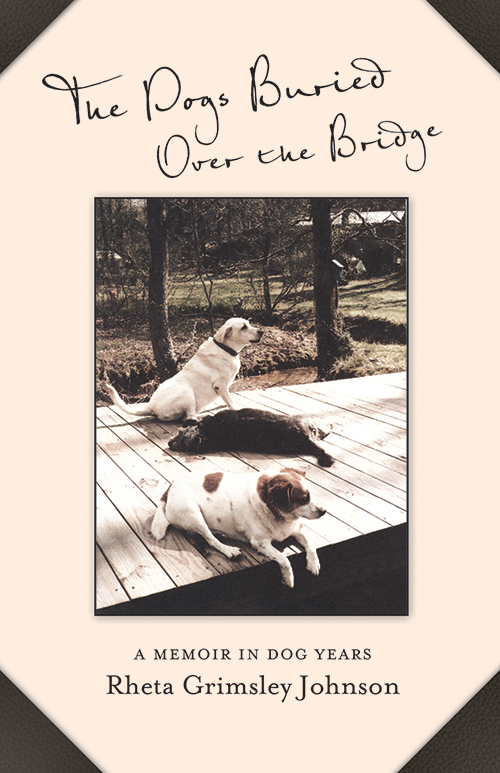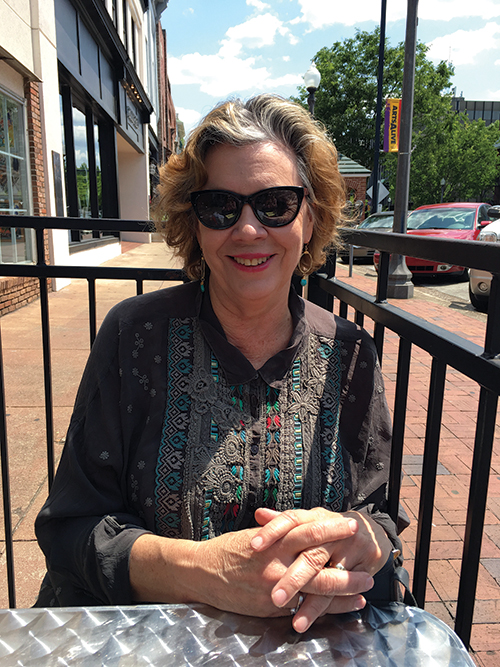
Writer’s beloved companions are metaphors for love and loss
By Jennifer Crossley Howard
In a culture of oversharing, online and otherwise, readers crave columnist Rheta Grimsley Johnson’s eloquent insights into a complicated and beautiful South.
Her fourth memoir, The Dogs Buried Over the Bridge, (John F. Blair, publisher, $26.95) debuted this spring.
Readers know her as a forthright writer who loves Paris and Hank Williams almost as much as her adopted state of Mississippi. Born in Colquitt, Ga., and educated at Auburn University, she made a name nationally writing columns at the Commercial Appeal in Memphis and then at the Atlanta Journal-Constitution. Her latest book chronicles her life alongside her dogs — those that were simply there and the one that broke her heart.
The book follows her 2012 title, Hank Hung the Moon and Warmed Our Cold, Cold Hearts (featured in the August 2012 Alabama Living).
“I wanted to write about things in life that are constant,” Johnson says, sitting at a sidewalk cafe in Florence, Ala. “One is my love of music and that I covered in the Hank book, and this involves the idea of living a simple life. Any life of mine has involved dogs.”
Writing about such a subject meant breaking a cardinal rule her editor at the Commercial Appeal gave her in 1982. Back then, she was the paper’s first female columnist, save the society pages.
“Don’t write about your dogs or your kids,” he told her.
She read between the lines that he was saying don’t write like a woman. Lose the sentimentality at the typewriter. This was more than 20 years before journalist John Grogan published his memoir, Marley & Me, about a rambunctious and devoted Labrador retriever.
“I guess I’ve always felt cheated that I should be able to write about my dogs if I want to,” Johnson says. “It’s sort of a feminist tract in a way because men always get to write about their dogs.”

Many of her column datelines are from Fishtrap Hollow, a crook of Pickwick Lake in Iuka, Miss., where Johnson resides. The cozy home with plenty of decks, antique roses and acres for dog roaming tends to pique the curiosity of her readers. The book is as much a recount of what her dogs taught her as it is a love letter to Fishtrap Hollow and its zany cast of characters.
“Whenever I would write about dogs I would get all these heartfelt letters, and people wanted to hear about my dog because they knew what I was saying,” Johnson says. “This, then, is about the place. The people and the animals and kind of ties it all up nicely, I hope, and maybe satisfies people who want to know more about this place.”
Johnson bought her home at Fishtrap Hollow as a hideaway to clear her mind and find some sort of peace and identity during a looming divorce. It became her permanent home, one that made her heart ache while she sat in Atlanta traffic.
“I was miserable in Atlanta, not because of the paper but because of the city,” Johnson says. “Once you’ve been out, it’s hard to get back to the city.”
She intends for Dogs to be her last book, and she wrote it as such, with a frankness that daily newspapers don’t always allow.
The raw writing is reminiscent of Enchanted Evening Barbie and the Second Coming, published in 2010. In that memoir, Johnson covered the suicide of her boyfriend, the recent death of her second husband, Don Grierson, and the life of a young reporter trying and thriving in the heyday of newspapers.
“That was the closest to the bone I had ever written,” Johnson says. “Don had just died, and I didn’t care what people thought about me. It was probably the most honest writing I ever did.”
She wrote Dogs at her home and during travels to Montgomery and Colorado. It took longer to write than others because her parents were ill, and both soon died. The convergence of family during that time brought plenty of grief, surprises and humor she plans to mine on paper.
A view of Pike’s Peak and the absence of friends and neighbors allowed her to write without interruption while her husband, Hines Hall, taught a history class at Colorado College. A puppy portrait hung above her desk in Colorado, a dog that could have passed for Mabel, pronounced “May-belle.” She is the dog, the blond Labrador, who broke Johnson’s heart. Before Mabel, dogs were just dogs — they lived outside, and made nice companions. They were kept at a comfortable distance. Johnson describes Mabel as the child she never had. Her black-rimmed Cleopatra eyes even inspired Johnson to get permanent eyeliner. In this interview, Johnson laughed and shared plenty of her trademark wit, but she spoke softer, quieter about her Mabel.
“There’s always one,” Johnson says. “It’s like the people in your life. You love a lot of people but there’s got to be one.”

Though Johnson’s ties to Alabama are many, having grown up in Montgomery, she landed in Mississippi in 1979, and has lived there part time or full-time ever since. “Kathryn (Tucker) Windham used to give me a hard time. All the time she’d say, ‘You’re an Alabama girl,’ ” Johnson says. “ ‘When are you going to move back?’ ”
Mississippi is a bit softer around the edges, she added, but one prominent Alabamian proved most influential to her.
“The person I learned the most about writing from and am still learning from every day is Hank Williams,” Johnson says. “If you can learn to tell love story in three minutes and forty-three seconds, which is how long ‘Cold, Cold Heart’ is, that’s good writing. That’s profound.”
Her love for Hank led to the book about his life, and a play about him that debuted this year in Pell City, written with John M. Williams. Their bond made a great substitute for the newsroom camaraderie Johnson missed being on the road scouting columns for most of her career.
She plans to start writing another play this summer. She finds the changeable medium refreshing after a career of 550-word columns.
“When a book comes out or a newspaper article or column, it’s too late,” Johnson says. “This is a living thing.”




